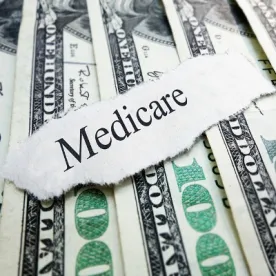Summary
The US District Court for the District of Columbia recently held that the Centers for Medicare and Medicaid Services (CMS) exceeded its authority by reducing Medicare payment rates for 340B drugs, but, because of the budget-neutral nature of the cuts, the court left implementation details of its order temporarily unresolved to avoid disrupting administration of the Medicare Hospital Outpatient Prospective Payment System. It remains to be seen what remedies the court will ultimately order and whether CMS will appeal the decision.
In Depth
On December 27, 2018, the US District Court for the District of Columbia held that the Centers for Medicare and Medicaid Services (CMS) exceeded its authority when it dramatically reduced Medicare payment rates for drugs purchased through the federal 340B drug discount program. The court acknowledged that the approximately 30 percentage point reduction in Medicare payment rates for 340B drugs was impermissible, but, because of the budget-neutral manner in which the payment cuts were implemented, the court left unresolved the question of how to effectuate the ruling, expressing concern about potentially wreaking “havoc” on the administration of the Medicare Hospital Outpatient Prospective Payment System (OPPS) if the court were to order CMS to make refunds to hospitals that were subject to the payment cuts during 2018. In the interest of avoiding such havoc, the court ordered the parties to submit briefs within 30 days suggesting how to remedy the issue.
In the meantime, many questions remain unanswered, such as: Will CMS appeal the ruling? When will the payment cuts be restored? Will CMS implement the expanded cuts to certain off-campus outpatient locations that were scheduled to take effect January 1, 2019? Will hospitals still be required to report claim modifiers related to the payment cuts?
Background on the 340B Payment Cuts
As discussed in an earlier OTS, as part of the Calendar Year (CY) 2018 updates to the OPPS (2018 Final Rule), CMS decreased Medicare Part B payments to hospitals for most separately payable drugs purchased through the 340B program and dispensed to hospital outpatients by almost 30 percent. Previously, CMS paid average sales price (ASP) plus 6 percent for these drugs when furnished to Medicare program beneficiaries, but under the 2018 Final Rule, effective January 1, 2018, CMS reduced reimbursement to ASP minus 22.5 percent for an almost 30 percentage point reduction in payment.
The 2018 Final Rule also required all hospitals participating in the 340B program paid under OPPS to report a modifier, regardless of whether the hospital was subject to the Medicare payment adjustment. Providers subject to the 340B-related payment adjustment are required to report modifier JG (drug or biological acquired with 340B Drug Pricing Program Discount) to identify if a drug was acquired under the 340B Program, while 340B hospitals that are exempt from the payment cut (rural SCHs, Children’s Hospitals and Cancer Hospitals) must report an informational modifier (TB).
CMS implemented the payment policy under the 2018 Final Rule in a budget-neutral manner, such that the Medicare program savings generated from the cut in drug payments are used to increase payments for all other services paid under OPPS, and are applicable to all hospitals. Accordingly, hospitals not subject to the payment reduction realized a substantial payment increase, which now is in question.
The American Hospital Association’s Lawsuit
Upon release of the 2018 Final Rule, the American Hospital Association (AHA) and America’s Essential Hospitals immediately sued CMS, claiming that the agency overstepped its statutory authority in reducing drug payments as outlined above. The original lawsuit was dismissed on jurisdictional grounds because the suit was filed before the 2018 Final Rule took effect and before any of the hospital plaintiffs had filed claims under the reduced reimbursement rate.
After losing an appeal in July 2018, the hospitals refiled the case in September 2018. The plaintiffs asked the court to require CMS to apply the 2017 OPPS drug reimbursement methodology—ASP plus 6 percent—to 340B drug payments made for the remainder of 2018, and pay the hospital plaintiffs, as well as all 340B program participants who are members of the association plaintiffs, the difference between the 340B drug payments received under the 2018 Final Rule and the higher payments that they would have received under the 2017 OPPS reimbursement methodology. The plaintiffs also asked the court to apply the 2017 OPPS reimbursement methodology in CY 2019 and subsequent years.
In its opinion, the court determined that “the [approximately 30 percent] reduction’s magnitude and its wide applicability inexorably lead to the conclusion that the Secretary fundamentally altered the statutory scheme established by Congress for determining [specified covered outpatient drug] reimbursement rates, thereby exceeding the Secretary’s authority to ‘adjust[]’ [specified covered outpatient drug] rates under § (t)(14)(A)(iii)(II).”
The court granted the plaintiffs’ motion, entitling them to equitable relief in the form of a permanent injunction against the payment cuts, but required both parties to provide a supplemental briefing on the appropriate remedy within 30 days. In the opinion, the Court noted that paying 340B hospitals at the 2017 rate, including retroactive payments, would likely be highly disruptive for CMS since an important component of the payment policy its budget neutrality requirement. Therefore, increasing reimbursement rates for 2018 could require CMS to retrospectively reduce reimbursements elsewhere in the program for 2018—which the court expressed could create “havoc.”
Analysis and Key Takeaways
At this time, it is unclear what remedies the court will ultimately order and whether CMS will appeal the decision. Noting that neither party thoroughly addressed the question of remedies in their briefs, the court ordered supplemental briefings on the issue of remedies from both parties. The briefings are due to the court within 30 days of the December 27 ruling, after which the parties will each have two weeks to respond to one another’s briefs. The court will then make a ruling on the issue of remedies.
Affected hospitals should note the following key points:
- To date, CMS has made no public statements about the decision or its intentions to appeal or implement changes as a result.
- In the interim period before the court issues a ruling on the remedies, it appears that CMS will continue to pay for 340B drugs at the reduced rates under the 2018 Final Rule.
- The court confirmed in a footnote that its opinion did not address the expansion of the reduced payment rates under the 2019 Final Rule to include 340B drugs dispensed at off-campus outpatient locations subject to Section 603 of the Bipartisan Budget Act because the plaintiffs had not yet submitted a concrete claim for reimbursement under the 2019 Final Rule. The AHA has separately filed suit challenging the 2019 Final Rule. Affected hospitals can expect to receive the reduced payments provided for under the 2019 Final Rule for 340B drugs dispensed at their off-campus outpatient locations unless the court takes similar action in response to the AHA’s additional challenge or CMS voluntarily implements a policy change.
- Although stakeholders also raised concerns about the administrative burdens and expenses associated with the claim modifier requirements implemented under the 2018 Final Rule, there is no indication that CMS is limited in its ability to impose such requirements, nor is it enjoined from doing so under the court’s opinion.
- The court’s opinion suggests that CMS may be unable to significantly reduce reimbursement rates for 340B drugs until it develops specific hospital acquisition cost survey data that demonstrates that the average acquisition costs for 340B drugs is significantly below the ASP plus 6 percent reimbursement rate. It is unclear when, or if, CMS will develop such data. Further, the court’s opinion indicates that it would be difficult for CMS to attempt similar approaches to reduce payments for other specific categories of outpatient drugs for which it believes current Medicare rates do not reflect acquisition costs.
- CMS recently announced its intention to establish an International Pricing Index demonstration project under which the agency would substantially alter how and how much it pays for Part B drugs. In a related OTS, we described potential implications for hospitals participating in and purchasing drugs through the 340B program. If that demonstration is advanced and implemented, it too could affect the outcome and implications of this case.







 />i
/>i

